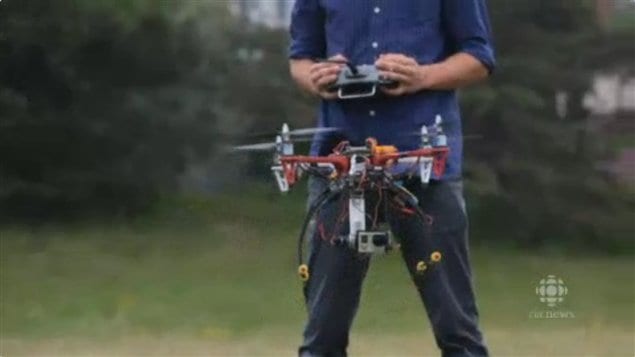Unmanned aerial vehicles are already flying over Canada and their increasing use has at least one researcher saying there need to be rules put in place to protect the privacy of citizens.
Drones are used by law enforcement agencies and emergency services, and by private companies for mapping or mineral exploration.
Canada’s constitution offers privacy protection as does a law entitled the Privacy Act, but that’s not enough according to Adam Molnar, a post-doctoral fellow at the Surveillance Studies Centre at Queen’s University in Ontario. He says drones can collect very detailed information, in a persistent way and that information can be correlated with mobile devices and shared between different organizations.

Police use drones
While the national police, the RCMP, says it does not use 18 drones to monitor people but to monitor the environment, Molnar says that is little consolation.
“It’s possible, through monitoring of the urban environment, that they could record the route and speed of every vehicle in the street,” says Molnar. “They could also observe movements of individuals and they can capture even the precise moment when lights might be turned on or off in a house.”
Safety regulations are not enough, says researcher
Canada’s department of transport currently has a working group developing regulations for drones, but Molnar say it is focussed on safety issues. He notes that 34 of the 52 people in the group are from the private sector and not a one is a privacy advocate.
Transport Canada could argue against considering privacy issues because its mandate is safety and not privacy, but Molnar disagrees. “This does raise some concern that when we have a primary body that is responsible for establishing the ground rules, that we don’t broaden that national working group to consider how this technology should reflect a broad base of Canadian interests and, in that sense, should include privacy considerations.”
Military has own rules
The Department of National Defense, which runs the Canadian military, has excluded itself from the rules set down by Transport Canada and that worries Molnar. He says that could lead to a “militarization” of domestic airspace because, in some cases, the military is increasingly engaging with law enforcement in domestic initiatives, which could open the door to information sharing arrangements.
“These trends…we’re already seeing them in the United States,” says Molnar, “and I think we have to be ahead of the curve and take them as a test case and really ask questions about whether this is a road that we want to go down.”
The office of Canada’s privacy commissioner has done some research on drones and is monitoring developments closely.







For reasons beyond our control, and for an undetermined period of time, our comment section is now closed. However, our social networks remain open to your contributions.